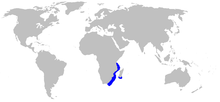
Summary
The African angelshark (Squatina africana) is an angelshark of the family Squatinidae.
| African angelshark | |
|---|---|

| |
| Scientific classification | |
| Domain: | Eukaryota |
| Kingdom: | Animalia |
| Phylum: | Chordata |
| Class: | Chondrichthyes |
| Subclass: | Elasmobranchii |
| Subdivision: | Selachimorpha |
| Order: | Squatiniformes |
| Family: | Squatinidae |
| Genus: | Squatina |
| Species: | S. africana
|
| Binomial name | |
| Squatina africana Regan, 1908
| |

| |
| Range of African angelshark (in blue) | |
Measurements edit
Born: 28–30 cm TL; Mature: ~ 80 cm (M), 90 cm (F) TL; Max: ~ 122 cm TL.
Identification edit
Color: Are a greyish or a reddish-brown, there are many light and dark spots, which are often large granular-centered ocelli in young fish. Obtains larger symmetrical dark bands or saddles, blotches on a broad, angular, high pectoral fins. It has a dark tail base, with white margins. Body: Has simple flat nasal barbels, with its tips tapering or spatulate. The anterior nasal flaps smooth or are slightly fringed. There are no angular lobes on lateral dermal flaps. Enlarged thorns on its head, and not back. Obtains a concave between its eyes.
Distribution and range edit
Western Indian Ocean: found in east and southern Africa; South Africa to Mozambique, Tanzania and Madagascar, and possibly Somalia. Nominal west African records possibly based on another species. 4°S - 32°S.
Climate and habitat edit
Subtropical; continental shelf and upper slope, demersal, marine. Usually found in sand and mud. From surfing too? - 494 m, but usually occurs at 60–300 m down.
Behavior edit
Lies in wait buried underneath sand or mud to ambush its prey with lightning-fast reflexes and great precision.
Biology edit
Diet: Feeds on small bony fishes, squid and octopuses, and including shrimp. Reproduction: Is ovoviviparous and gives birth to at least 7 or 11 pups per litter.
Status edit
IUCN Red List: near threatened. It is common only on the east coast of South Africa. Trawl fishery bycatch.
Threat to humans edit
Traumatogenic.
Resilience and vulnerability edit
Very low, minimum population doubling time more than 14 years; high vulnerability.
References edit
- ^ Cliff, G.; Bennett, R.; Da Silva, C.; Ebert, D.A.; Fennessy, S.; Fernando, S.; Gledhill, K.; Jabado, R.W.; Kuguru, B.; Leslie, R.; McCord, M.E.; Samoilys, M.; Winker, H. (2019). "Squatina africana". IUCN Red List of Threatened Species. 2019: e.T44996A113073072. doi:10.2305/IUCN.UK.2019-1.RLTS.T44996A113073072.en. Retrieved 18 November 2021.



